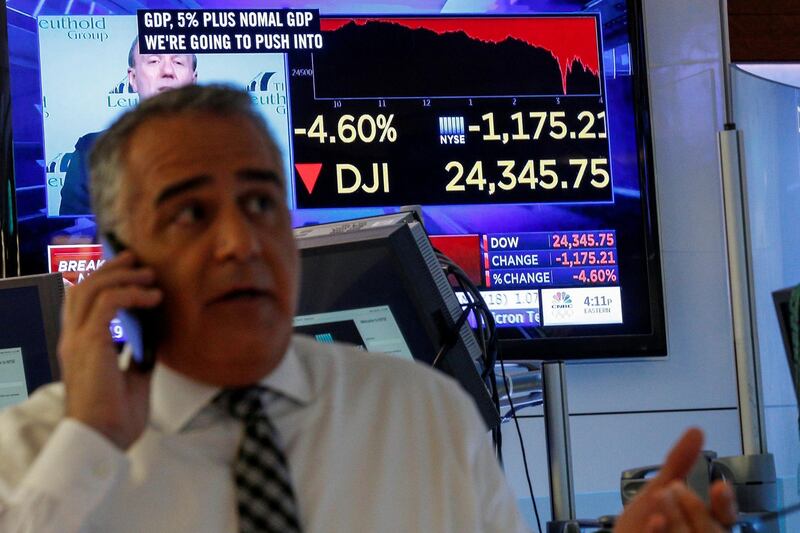US stock markets plunged sharply on Monday, wiping out gains made in 2018 so far, as investors reacted to fears of interest rate rises, threatening President Donald Trump's boasts that he was overseeing a period of accelerating prosperity.
The Dow Jones Industrial Average closed down by 1,175 points, or 4.6 per cent, its biggest fall in more than six years.
Without a late rally it could have been much worse and followed steep losses on Friday as analysts warned investors to expect a period of extreme volatility.
The trigger appeared to be US jobs report released last Friday that said wages were rising at their fastest rate since 2009, prompting warnings of accelerating inflation and a year of interest rate rises ahead.
The question now is whether the fall marks an expected correction after years of steady gains or whether it signals an abrupt end to a low inflation, low interest rate era.
David Kelly, the chief global strategist for JP Morgan Asset Management, said the signs of inflation and rising rates are not as bad as they looked, and that stocks were due for a drop.
“It’s like a kid at a child’s party who, after an afternoon of cake and ice cream, eats one more cookie and that puts them over the edge,” he said.
Such sanguine analysis may not have survived the day, were it not for a late rally after trading screens turned red across Wall Street.
The Dow Jones Industrial Average lost 4.6 per cent of its value – its biggest percentage fall since 2011 – taking it down 8.5 per cent from its record high in late January.
But at one point it was down as much as 1,600 points, or more than 6 per cent, before rallying.
The previous record fall in a day was 777 points, set during the 2008 financial crisis.
The mayhem puts Mr Trump in an awkward position. He has tied his economic record to gains in the stock market, frequently claiming his policies of tax cuts and deregulation were responsible for record highs.
“The stock market has smashed one record after another, gaining $8 trillion in value,” he said in his State of the Union address just last week.
Critics immediately said that if his policies were responsible for the gains then he must also take responsibility for the pain.
Jay Carney, who served as former president Barack Obama’s press secretary, said on Twitter: “Good time to recall that in the previous administration, we NEVER boasted about the stock market - even though the Dow more than doubled on Obama's watch - because we knew two things: 1) the stock market is not the economy; and 2) if you claim the rise, you own the fall.”
Good time to recall that in the previous administration, we NEVER boasted about the stock market -- even though the Dow more than doubled on Obama's watch -- because we knew two things: 1) the stock market is not the economy; and 2) if you claim the rise, you own the fall.
— Jay Carney (@JayCarney) February 5, 2018
The White House responded with a statement expressing confidence in the state of the economy.
“We're always concerned when the market loses any value," said an official. “But we’re also confident in the economy’s fundamentals.”
However, a key index of market volatility spiked on Monday suggesting there could be more trouble ahead.
The Cboe Volatility Index (known as Vix) rose by as much as 90 per cent, touching its highest level since the devaluation Chinese yuan in 2015, suggesting a period of worse instability than the sell-off that followed the UK Brexit vote.
The slump in the Dow was reflected in other US indexes. The S&P 500 was down 3.8 per cent and the technology-based Nasdaq lost 3.7 per cent of its value.
Shockwaves extended around the world
Britain's FTSE 100 lost 1.5 per cent while a similar loss was registered by France's Cac 40 in reaction to Friday's losses.
In early trading in Japan on Tuesday, the Nikkei index was down 1,025 points, 4.6 per cent of its value. Hong Kong's Hang Seng was down 4 per cent at 30,951.63, a fall of 1,293 points.
Bitcoin prices also continued to slump, losing another 15 per cent, according to Coindesk, and dropping under $7,000, a far cry from highs of almost $20,000 at the end of 2017.
David Madden, market analyst at CMC Markets, wrote on their blog: "Equity traders were enjoying a bullish run recently, and the jolt from the major decline in the US last Friday has triggered a worldwide round of profit-taking."
The falls came on the day Jerome Powell was sworn in as the new chairman of the US Federal Reserve. His job will be to sustain economic growth without letting overheating conditions startle investors.
In a video message, he said he would support continued a healthy job market but stay “vigilant” to any emerging risks.






